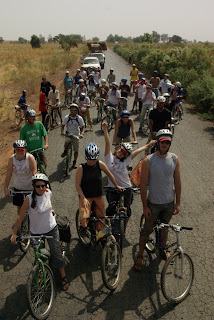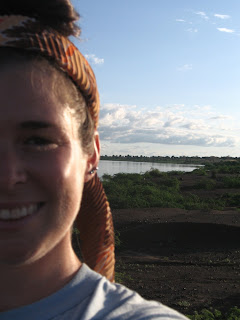



After a teary goodbye with Mike, I joined my father, Tom, and his friend Jack Ford for a week long safari into some of Tanzania and the world's most famous game parks. Our guide, Frank, was an extremely kind and knowledgeable companion. He had been leading safaris ( safari = "journey" in Swahili) since 1969 and took a keen interest in the behavior and habitat of the animals.
Within minutes of entering Lake Manyara NP, there were baboons walking around our Land Rover and a herd of elephants munching trees a few hundred yards away. We saw herd after herd of gazelle, a warthog take a dip in a stream, the vervet monkey with testicles as bright as blue gumballs, and a lionness eyeing the plains. In the distance the lake looked pink with flamingos, and giraffes crossed in front of our path. As the afternoon wound to a close, we wound our way up the cliff to our lodge perched on its edge. The evening's buffet started a week of decadent and abundant food that seemed to get better with each new hotel.
The next two days we spent traveling through the Serengheti. I was surprised by how flat and barren it was in some areas. It recalled places in Wyoming or Texas with the flat, far reach of the horizon and lack of trees or water. It was here where we saw the largest groups of migrating wildebeest leading the march for the buffalo and zebras that accompanied them. Later in the afternoon we saw a leopard asleep on a tree limb and the rare spotting of FOUR cheetahs laying low in the grasses.
I think the coolest experience of the safari happened on our second day in the Serengheti. In a park that can sometimes be crowded with 4x4s, we were the only vehicle on the road as we pulled up alongside a lionness crouched next to the gravel. We watched for an hour as she stalked some topis in the distance. Three hyenas caught onto her plan and started circling the larger territory, as if licking their lips. The gazelles across the road stood at attention, able to smell her scent upwind. Further down the road eight giraffes crossed, oblivious to her presence and in the distance a herd of about twenty elephants loped about. The lionness slowly creeped towards the topis, alternating between crouching and a low walk. Then at once she took off! Her bulging muscles carried her into a sprint, but, tough luck, the topis darted off to safety. That night as we reached the new hotel, monkey's ran down the outdoor hallways and signs warned us not to walk around the property at night. With good reason! As I turned out the light for bed I heard two lions roaring in the vicinity of our hotel. Awesome!
The next day we visited a Masaai village to observe some of the traditions of this warrior people. They showed us how they built their small huts out of animals skins and dung and explained how they drink a mixture of the milk and blood of their animals as a typical staple. When I asked if they caught the blood in a bowl after slitting its throat, the village chief's son immediately put his finger to his mouth to signal the taboo I made. Dad and Jack got their first taste of life in an African village and saw how debilitating the simple hardships such as fetching water can be, a rare and expensive commodity in the plains.
We then went on to the Ngorongoro Crater via the Olduvai Gorge. Literally a crater from a fallen volcano, the animals are essentially corraled into this huge expanse. Occasionally the elephants and buffalo will venture to the top of the rim, but otherwise it is easy to spot many animals on any given day. You think National Geographic has some special access, but really it's just special cameras! Even from the deck of our hotel perched on the crater rim, we were able to see three engangered black rhinos through binoculars. When we entered the crater, Frank was able to track a rhino at a close distance. We also saw a male lion strut slowly across the road in front of us after making a kill and a cheetah gaurd her fresh prey. The safari ended when we returned to our hotel for another delicious meal and a lively musical performance by a Maconde dance tribe, known for their colorful costumes and use of masks. With that, a long but amazing vacation came to an end and I started the transition back to my "bush" life in Niger.
(photo index: elephant in Lake Manyara NP, Dad (L) and Jack, the Masaai, the lionness stalker)














